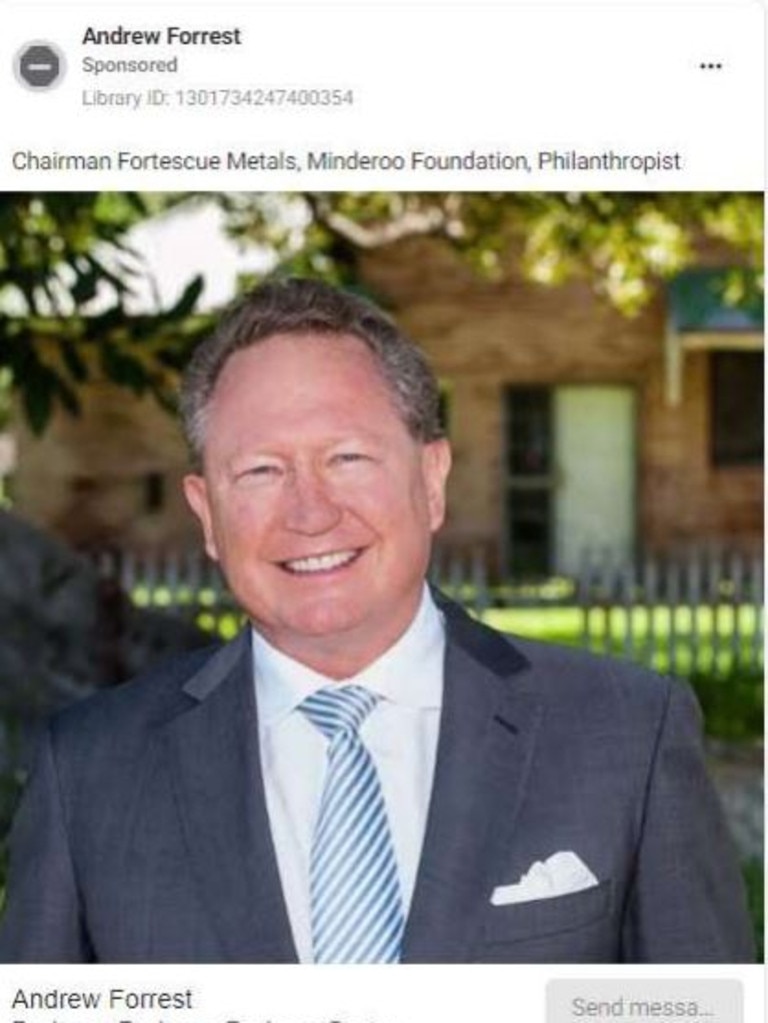NAB report blast Meta and other social media giants tardiness on scams
Almost half of all Australians believe Facebook’s owner and social media giants are doing ‘not much at all’ to combat scams, a NAB report reveals.

Mining billionaire Andrew Forrest is not alone in his battle to make Meta take down fraudulent advertisements, according to data from National Australia Bank.
A NAB report has revealed that almost 50 per cent of Australians believe Facebook’s owner and social media giants are doing “not much at all” to combat scams.
The lack of action has prompted Dr Forrest to sue Meta in the US, challenging a 30-year-old law that protects internet companies from what users post on their websites.
Dr Forrest first raised the fraudulent advertisements with Meta in 2014. Nothing happened. He wrote to Meta founder and chief executive Mark Zuckerberg, but didn’t hear back.
This is despite NAB executive for group investigations, Chris Sheehan – who worked for the Australian Federal Police for almost 30 years – declaring “we’re in the middle of a global scam epidemic”.
“Stopping the crime before it happens is the only way we can stop scammers targeting Australians,” Mr Sheehan said.
“That takes banks, telcos, social and digital media platforms and consumers all playing their part.”

But NAB’s latest scam report reveals that many Australians believe social media companies aren’t doing enough to aide the co-ordinated approach that Mr Sheehad advocates.
About 47 per cent of Australians said that Facebook and others were doing “not much at all” to educate people about scams. Overall, the NAB report revealed about 14 per cent of the population believed that internet providers were helping to combat scams.
That compares with more than a quarter of Australians believing the banks are doing “a lot” to stop scammers, while 23 per cent say the federal government, police (22 per cent) and telcos (17 per cent) were “doing a lot to educate them about scams”. “Scams start with a text message, a phone call, a dodgy social media post, fraudulent ad or a fake website. Banks are often blind to this activity until the payment is made. And, in many cases, the criminals have socially engineered the person to make the transaction themselves and coached them how to answer questions that banks might ask,” Mr Sheehan said. “This adds another layer of complexity to try to detect scam payments among legitimate ones.”

Mr Sheehan said the banking industry’s ‘‘Scam Safe Accord’’ identified seven key areas.
“NAB has either completed or is on track to deliver initiatives against these priority areas. The banking industry will also introduce a new $100m Confirmation of Payee system in 2025.
“Pleasingly, we are starting to see this action have an impact, with NAB customer scam losses starting to reduce. An ACCC (Australian Competition & Consumer) report in May showed scam losses reported to Scamwatch between January and March this year are down by 11 per cent compared to the previous quarter. (But) we know that there is more to do.”

Assistant Treasurer Stephen Jones said the government had spent more than $67m so far this year in “the war on scams”. He said 601,000 Australians reported losing $2.74bn to scams in 2023.
He told the National Press Club that a new SMS Sender ID register would be mandatory in an effort to stop scammers. But this attracted criticism from TPG after it was revealed that the Communications Department is spending almost $150,000 on a cost-benefit analysis from Deloitte to also consider a voluntary option.
“Instead of wasting time and taxpayer dollars on pointless reviews and cost-benefit analysis, we need to fast-track a mandatory SMS sender registry to slam the gate shut on scammers,” TPG spokesman Mitchell Bingemann said.
A Californian judge last week dismissed Meta’s appeal against a June ruling that Dr Forrest’s fight against the company had merit.
Meta sought to use a 30-year-old US law that gives social media companies immunity from the content that users post on their platforms. But Dr Forrest argued that advertising was different to users’ posts, given Meta accepted money from advertisers and had a screening process before publishing.
Meta argued before judge Casey Pitts that third party players were still creating the content and under the present law it was not responsible.
Dr Forrest’s lawyer, Joshua Matz, said the dismissal of Meta’s appeal efforts was an “important legal win”.
Mr Matz said there were enough allegations of wrongdoing for the case to now proceed to discovery and it would not make sense to send the case for an immediate appeal.
“This is an important case, and it has the potential to make clear that Meta cannot continue to co-create and otherwise involve itself in the development of scam ads. We are therefore pleased that Judge Pitts gave the issues careful consideration and reached the correct result,” he said.
Originally published as NAB report blast Meta and other social media giants tardiness on scams



